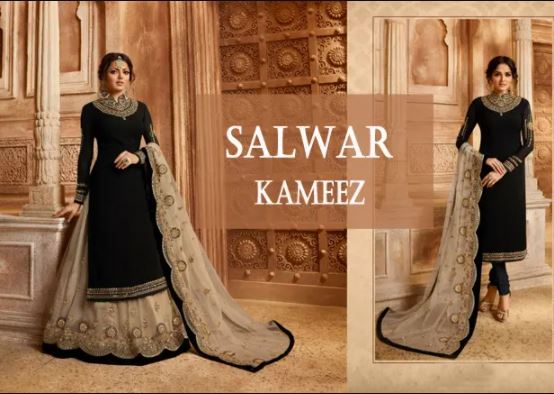A Suit That Be-Fits All
The salwar-kameez, popularly known as the Punjabi suit, has traditionally been worn by North Indian and Pakistani women and their siblings, who then took it overseas for the world to witness. It is a combination of three separate parts: a Kameez (top), a Salwar (bottom), and a Chunni (stole, also popularly known as dupatta). These three attributes have remained constant, though women, might not prefer Chunni on certain occasions depending on the Kameez designs.
The Mughals were the first to introduce the concept of Salwar Kameez as we know it today. The Men and women of the Mughal Empire wore attractive and expensive clothes made from the finest materials and adorned themselves with jewellery from head to toe. The dress was made of muslins, silks, velvets, and brocades.
Everything You Need To Know About The Salwar Kameez
Classic Suit
There has always been a “traditional salwar Suit” that maintains all the components and slight contemporary over long periods. These suits are interpreted according to the wearer’s peculiar tastes. For, the “Patiala suit” (from the princely state of Patiala in the Punjab region) is worn by all possible women in that area regardless of caste, class, and religion. It has remained the same for many years. It includes a knee-length Kameez, a baggy Salwar (more voluminous than average), and a long Chunni. This classic style is distinctive and is widely recognized as an iconic attire of this region of Punjab. Punjabi customs inspire different styles and designs. Salwar Kameez came out from so many traditions & worn in many cultures in many forms and styles because they are easy to carry out and carry respect. Kolkozy brings a wonderful collection of Designer Indian Salwar Suits worth every occasion to don.
Into the Mainstream
In the 1990s and early in the twenty-first century, Salwar Kameez emerged as a mainstream high-fashion garment, popular both on the catwalk and on the street. The fashion gained popularity when high-profile celebrities donned it during their public appearances. The suit thus has been re-characterized as a “global chic” garment. Global fashion entrepreneurs have played a key role in moving the suit beyond “Indian” and “Ethnic” markets into the mainstream. They have invented new styles that conceal cultural differences through their design sensibilities and retail skills. Along with older women wearing Salwar Kameez, they have transformed what was earlier negatively tagged as “immigrant ethnic clothes,” derided by the mainstream, and have now turned them into the most fashionable clothes of our times, crossing all geographical barriers.
FreshAppeal
Today, women from all walks of life assert their identities through this comfortable outfit, which they consider infallible for any event, personal or professional. Another dimension of Salwar Kameez’s popularity is the contemporization of its design, both in the Indian subcontinent and worldwide. Design professionals have created innovative new styles and silhouettes while relying upon and helping to revive old traditions of embroidery, dyeing, and other forms of decorating. These new design inputs have led to dramatically expanding markets for the salwar kameez worldwide. Salwar Suits of all types and levels of quality are sold at a wide range of prices in these markets. Designer Salwar Kameez that bear “designer labels” might cost $400 to $1200, while suits selling for as little as $50 can be found in the street markets. On the other hand, the Online Salwar Kameez market has become quite elaborate.
Cultural Confidence
Yet, in this complicated and multifaceted economy, the real heroes are the older women, who wear their “classic suits” despite the cultural and racial odds and regardless of how they are socially perceived. These powerful and culturally rich women are the agents of sartorial transmission, who socialized their second-generation daughters to wear the Salwar Kameez on their own terms with sheer confidence. That led to pathbreaking fashion entrepreneurs creating online commercial markets for Salwar Kameez across the globe.
Westernization of Asian Culture
Salwar Suit trends are part of the broader dynamics of the globalization of Western culture and of images created by Asians living in the West, as seen in film, music, literature, and other media. Indo western salwar suits beautifully capture the trends of the West while keeping us close to our roots. In this speedy globalization, several women favour adopting the Salwar Kameez for its plethora of styles and all-round comfort—this zeal for characterizing the Salwar Kameez as global designer wear led to an Indo-western Kurtis fusion. Indo-Western Salwar Kameez is a mid-way fashion for those who don’t wish to go too Indian or Western. It perfectly fuses Indian trends and Western styles, giving us the best of both worlds. Global Designers have recreated a traditional Indian dress according to Western patterns to suit those women who don’t wish to give up Indian wear while still wanting to look stylish and contemporary at the same time. Indo-westerns have endless styling options, but it becomes essential to know what suits you best before laying hands on your favourite pair of Salwar Kameez. Even an excellent designer piece can look disastrous if it doesn’t fit your body type.
We at Kolkozy offer an exhaustive range of designer salwar kameezes that are affordable and suitable for all occasions.

















